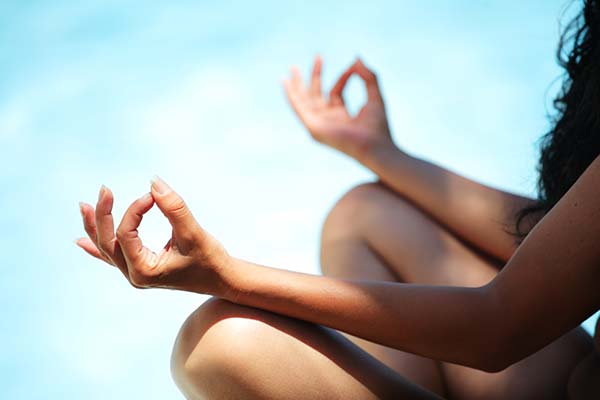I’ve been writing about yoga a lot because I’ve used it in so many ways: to lose weight, stay in shape, keep flexible, and more. But the best benefit I’ve found is that yoga is a great way to clear my head and flush out all the accumulated stress from the day.
Keeping a yoga practice may be a terrific method stay in shape, to reduce stress and relax the mind. But when it comes to anxiety relief, not all yoga poses are created equal: Some positions are especially powerful for promoting strain relief, relaxation and restfulness.
Seated postures like child’s pose can cause feelings of calm while empowering positions like standing forward bending and eagle pose can relax the mind while energizing the body, and help set your head in a meditative state.

When pressure creeps into your relationship bank account, manager, beloved, or supposed sources of strength, give this soothing workout a try. Surrender to some yoga and serenity is yours–and you can take that straight to the bank.
Use this sequence to relax your nerves after a stressful day.
Studies show that chronic stress increases the chance of growing mental and physical problems, like high blood pressure, ulcers, immune dysfunction, and melancholy and inhibits your ability to fix.
To break the cycle, it helps to train body responses and your thought processes to slow down. Restorative yoga helps repair well-being with gentle positions that relieve the pressure and exhaustion we accumulate during daily life.
This poses, intended to be performed as a sequence, are made to relieve tension that was muscle that was pent up and stimulate the immune and lymphatic systems. Use the poses to build your own practice depending on the time you have available.
Remain in each pose for a couple of minutes while breathing deeply, and always end in Savasana, the classic yogic posture of deep relaxation in which you’re lying down but still awake. (In fact, just this one stance done three times per week may do wonders.) Taking time to experience calm and the remainder that come from restorative yoga’s healing practice will help reduce your stress levels, improving your general health and well-being.
Namaste: Greeting Your Breath
Begin with your feet firmly planted and arms by your sides. As you inhale, cross your arms upwards and out to the sides (palms facing the ceiling) until the palms fulfill overhead (shown left). Exhale with the hands and slide down them before your face, stopping at your heart (shown left, inset). Maintain your attention on your breath.
Half Wall Hang
With your hands shoulder-width apart, put your palms against a wall or door. Begin slide your hands down until your hands and shoulders and to walk your feet from the wall are at about the height. Keeping knees slightly bent, press your hands lightly into the wall and lean your body away from it (shown right) to stretch the muscles that run along the back, where many people often hold pressure.
Allow your head to drop slightly, and take several deep breaths. Focus on relaxing the area around your jaw, as the muscles there are just some of the strongest in your body and tend to clamp down when you’re under pressure, with each exhale. If you are all set to come out of the pose, walk back toward the wall slowly to prevent any light-headedness.
Shoulder Stretch On The Wall
Stand so one side of the body is facing the wall with a space and your body of about three quarters the amount of your arm. Reach the arm closest to the wall and put your palm.
Keeping the hand in position, gradually rotate your system from the wall (shown left), stretching the shoulder area. Breathe fully and intensely for several breaths. Feel this pose releasing tightness around the shoulder, upper back, neck, and upper chest.
Come out of the pose by inhaling and stretching the fingertips to the ceiling, then letting your arm swing front to back at your side. Turn so your body’s other side faces the wall and repeat.
Child’s Pose
Begin with the knees broader than the hips in your hands and knees, and then sit back onto your heels. Extend your arms out in front (shown right) or drape them, palms upwards, back by the sides of your legs toward your feet. You can even rest your upper body and brow on pillows or stacked blankets if lowering to the floor feels uneasy.
Breathe deeply and feel the breath stretch the muscles around the rib cage. Take several deep breaths and after that walk your hands to the other side. If you are ready, walk your hands toward your knees and return to some seated posture.
